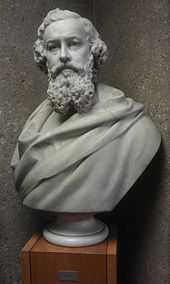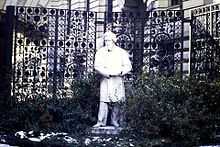George Dawson (preacher)
| George Dawson | |
|---|---|
 | |
| Born |
24 February 1821 London, England |
| Died |
30 November 1876 (aged 55) Kings Norton, Birmingham, England |
Resting place | Key Hill Cemetery, Birmingham |
| Nationality | English |
| Education | Marischal College, Aberdeen |
| Alma mater | University of Glasgow |
| Known for | Preaching the Civic Gospel |
| Religion | Nonconformist Christian |
George Dawson (24 February 1821 – 30 November 1876) was an English nonconformist preacher, lecturer and activist. He was an influential voice in the calls for radical political and social reform in Birmingham, a philosophy that became known as the Civic Gospel.
Ministry

He was born in Brunswick Square, London in 1821, his father was headmaster of a Baptist school. He was educated at home, then at Marischal College, Aberdeen, and the University of Glasgow. Oxford and Cambridge were not an option as Nonconformists were banned from these universities.
In 1843 Dawson accepted a call to the pastorate of the Baptist church at Rickmansworth. He moved to the rapidly expanding industrial town of Birmingham in 1844 to become minister of the Mount Zion Baptist Chapel where the eloquence and beliefs that the young man expressed soon attracted a large following.

However, Dawson's views did not fit the orthodoxy of the Baptist church, so in 1845 he left, followed by much of his congregation, to become minister of the theologically liberal Church of the Saviour, a Unitarian church erected for him by his supporters, where "no pledge was required, of minister or congregation; no form of belief was implied by membership; no difference in creed was allowed to bar union in practical Christian work'.
The key doctrine preached there was inscribed on a marble tablet above the entrance - "There is but one law - thou shalt love the Lord thy God with all thy heart, and thy neighbour as thyself."
Civic Gospel
In the Church of the Saviour, Dawson developed the concept of the Civic Gospel. He called upon his congregation to join him in the struggle "to improve conditions in the town and the quality of life enjoyed by its citizens". His sermons were unconventional for the time, it was said that Dawson "preached not as a dying man to dying men - that was the old idea of preaching - but as a living man to living men who found life no simple or easy matter." His sermons electrified the Birmingham public and influential members of his Church included Joseph Chamberlain (who took Sunday School and oversaw the accounts), Jesse Collings, and the Kenrick family, all of whom played an important part in local affairs and took on his ideals.
From his pulpit and in public lectures and articles, Dawson advised Christians (particularly people experienced in business) to become councillors and help transform the City, a call which Joseph Chamberlain answered in his work first as Councillor, then as a visionary social reforming Mayor. His idea of the civic gospel and his advocacy of free education was strongly supported by the Congregational spokesman Dr. R. W. Dale, and by J. T. Bunce, influential editor of the Birmingham Daily Post. Both Dawson and Dale were disqualified as ministers from seats on the town council, but both served on the Birmingham school board. Dawson strongly advocated to the worshippers in his Church and in Birmingham the idea of service in politics as a civic duty and as service to God.
Views

Dawson did not consider himself to be a Unitarian, although modern Unitarians count him as one of their own (he is listed by the Midland Unitarian Union as a great nineteenth century Unitarian [1]). He left the Baptist Church to be free of any definite creed or doctrinal rigidity.
"True Religion", Dawson believed, was "social, unitive, and brotherly in its spirit: it produces the church as its social development". For him, Christianity was "a set of fruitful principles", not a code of laws or a theological dogma.
Other interests
Dawson was famous during his lifetime for lecturing on a wide range of subjects from Shakespeare to German poetry, Italian history to good etiquette. He became a national figure, in demand as a lecturer throughout the country. Charles Kingsley described him as "the greatest talker in England". Dawson was a friend of Carlyle and Emerson and did a great deal to popularize their teachings, especially in his demand for a high ethical standard in everyday life and his insistence that citizenship needed a specifically Christian approach.
Dawson also lectured on English literature at the Birmingham and Midland Institute and helped to found the Shakespeare Memorial Library in Birmingham. His address at the opening of the Birmingham Reference Library [2] gives a flavour of what the civic gospel meant to the Victorian municipal activists:
The opening of this glorious library, the first fruits of a clear understanding that a great town exists to discharge towards the people of that town the duties that a great nation exists to discharge towards the people of that nation - that a town exists here by the grace of God, that a great town is a solemn organism through which should flow, and in which should be shaped, all the highest, loftiest, and truest ends of man's intellectual and moral nature... We are a Corporation, who have undertaken the highest duty that is possible to us; we have made provision for our people - for all our people - and we have made a provision of God's greatest and best gifts unto Man.
He died suddenly at Kings Norton on 30 November 1876, and was buried in Key Hill Cemetery. He was survived by his wife Susan and son Bernard
Four volumes of Sermons, two of Prayers and two of Biographical Lectures were published after his death.
Recognition

A statue of Dawson formerly stood in Victoria Square, Birmingham (and latterly in Edmund Street, near there). It is currently in store at Birmingham Museum and Art Gallery's Museum Collections Centre, awaiting restoration and repair.

A bust of Dawson is now on the ninth floor of the Library of Birmingham.
See also
Life by H. W. Crosskey (1876) and an article by R. W. Dale in The Nineteenth Century (August 1877).
References
 This article incorporates text from a publication now in the public domain: Chisholm, Hugh, ed. (1911). "Dawson, George". Encyclopædia Britannica 7 (11th ed.). Cambridge University Press. p. 874.
This article incorporates text from a publication now in the public domain: Chisholm, Hugh, ed. (1911). "Dawson, George". Encyclopædia Britannica 7 (11th ed.). Cambridge University Press. p. 874.- Records: Church of the Saviour Founded and built 1847-95; Birmingham RL (258925; 259532; 260167 George Dawson Collection; 264036).
- Briggs, A. (1963) Victorian Cities, Harmondsworth: Penguin Books.
- Dale, A. W. W., Fairbairn A. M., Rogers, J. G. (1899) The Life of RW Dale, of Birmingham, London: Hodder and Stoughton.
- Hunt T. (2004) Building Jerusalem: The Rise and Fall of the Victorian City, London: Weidenfeld and Nicolson pp 232–265.
- Marsh, P. (1994) Joseph Chamberlain: Entrepreneur in Politics, New Haven, Mass: Yale University Press.
- Plant, H (2000) Ye Are All One In Christ Jesus: Aspects Of Unitarianism And Feminism In Birmingham, c. 1869–90, Women's History Review, Vol 9, 4
- http://www.birmingham.gov.uk/GenerateContent?CONTENT_ITEM_ID=45002&CONTENT_ITEM_TYPE=0&MENU_ID=260
- http://www.midlandunion.org.uk/history.html
|